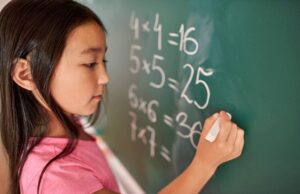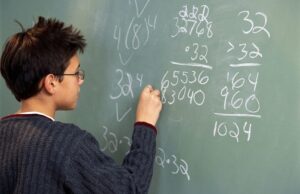TIMSS is an international program for assessing the performance of students at level CM1 and fourth level in mathematics and science. France’s participation in this programme, which has taken place every 4 years since 1995, is modest (it has taken part four times, in 2015 and 2019 for CM1 students; in 1995 and 2019 for 4 e ). The objective is to produce a database enabling national educational choices in mathematics and science to be positioned in relation to established standards, in order to promote international comparisons.
Statistical data make it possible to identify at least three essential factors which condition the performance of pupils: the content, the organization and progression of programmes, the attitude of pupils towards mathematics and the training of teachers.
All of the mathematical content on which the assessment of fourth-grade students focused is divided into four areas: numbers (30% of the assessment), algebra (30%), geometry (20%) and data analysis (20 %). This content was not all seen by French pupils: 54% of fourth-grade pupils received lessons relating to all of the content; this is the case for approximately 80% of CM1 pupils in the sample.
It emerges from TIMMS France that in reasoning, fourth-grade pupils perform better than in the application of mathematics, and restitution of knowledge; for primary school pupils, it is the opposite. That said, the choices of programs and their progress in mathematics cannot in any way justify, on their own, these poor student performances.
Statistical data from TIMSS also shows that the more students love math, the better they perform on assessments. But only half of CM1 pupils say they really like mathematics and this proportion drops very sharply in fourth (11%). Unsurprisingly, these same data also emphasize the positive link between students’ appreciation of mathematics and their performance. This confirms the data of developmental psychology establishing the correlation between pleasure in learning and success in learning.
Teachers: training issues
As far as teacher training is concerned, both in CM1 and in fourth, more than 60% of pupils have been in the charge of teachers who express the need for additional training allowing individual support for pupils, development of their critical thinking and their ability to solve problems as well as the integration of technological tools in the various phases of teaching.
The need for professional development felt by teachers engages the responsibility of decision-makers and educational actors to put in place support systems to meet the challenges of teacher training and that of their students.
From a constructivist perspective, we change when we have the opportunity to realize the contradictions between what we want to do, what we do it for, what we believe we are doing and finally what we are doing. Making all students experience the pleasure of doing mathematics is particularly emblematic of this hiatus between their will and their reality.
It is clear that the ranking of France in TIMSS is quite striking, it is difficult to imagine France almost in the last rank of nations in mathematical education. But this awareness of these results and the link with teacher training must be a historic opportunity to change and transform this reality. to be able to think, work and participate in the world of today and tomorrow.
Bringing a taste for math
Making people love mathematics and practicing them with pleasure is clearly a promising avenue for this challenge. The Villani-Torossian report mentions for the first time, abundantly (22 times) this dimension of mathematics. One could hope that this shift bears fruit. However, in this report, practically no class pedagogical device is highlighted to succeed in concretely translating this recommendation. And, despite all the teachers’ wishes, putting the pleasure of doing mathematics at the heart of the student’s activity is not so natural.
The essence of mathematics intrinsically includes this dimension of pleasure through the discovery not only of a new world but also of one’s own ability to understand this world. Moreover, most teachers did not experience such devices themselves during their schooling. The challenge is then to help them become aware of them and design them.
Beyond the teachers’ original background (who may initially come from a wide variety of training areas as far as teachers of CM1 pupils are concerned), it is imperative to give This opportunity can be seized in the development of the dissertation in the training of all teachers.




